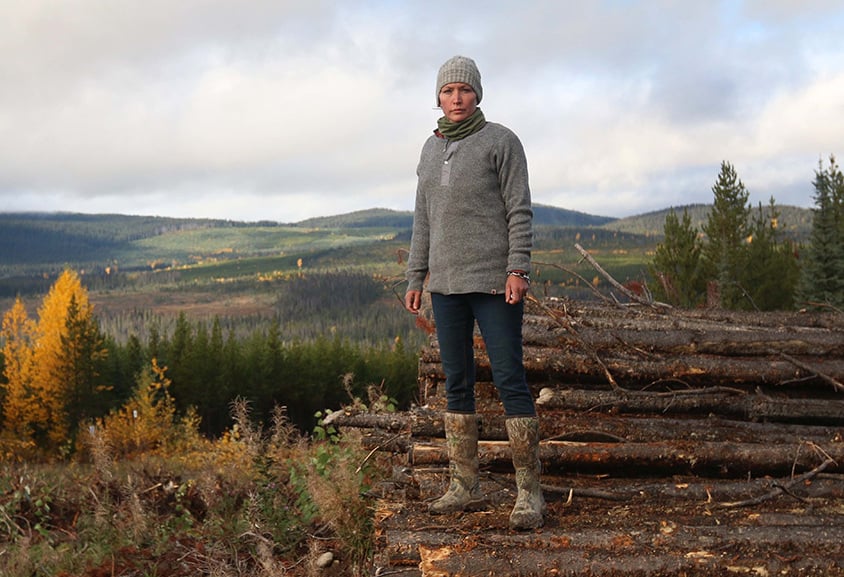The Crown will proceed with criminal charges against four people arrested in November at a worksite for the Coastal GasLink pipeline project currently under construction through northern B.C.
The announcement, made by Crown prosecutor Tyler Bauman during an appearance today in B.C. Supreme Court, brings the total number of people facing criminal contempt charges for their role in blocking access to the pipeline route to 19.
The Crown announced it would proceed with charges against 15 others — the first criminal contempt charges for allegedly violating Coastal GasLink’s civil injunction — last month.
Among the four who learned about their charges today is Molly Wickham, whose hereditary name is Sleydo’, a member of the Gidimt’en Clan of the Wet’suwet’en Nation and an outspoken opponent of the pipeline project. The 670-kilometre pipeline is being built to deliver fracked gas from northeast B.C. to an LNG export facility under construction in Kitimat.
Wickham called the decision “disappointing and frustrating.”
“It’s really hard to be framed as a criminal in our own lands,” she said following the appearance. “But it’s definitely not going to deter me from knowing and doing what is right.”
Wet’suwet’en Hereditary Chiefs have voiced opposition to pipelines through the territory for well over a decade, since before the Coastal GasLink project was first proposed. Barricades blocking access to pipeline construction crews first appeared on the remote resource Morice Forest Service Road in 2009.
In December 2018, B.C. Supreme Court Justice Marguerite Church issued an injunction to the company that barred anyone from blocking access to pipeline worksites or access roads.
Members of the Wet’suwet’en Gidimt’en Clan responded by creating Gidimt’en Camp, an occupation 44 kilometres down the Morice Forest Service Road, which provides access to the pipeline route through Wet’suwet’en territory.
The first of several high-profile police actions in the Morice area took place weeks later, on Jan. 7, 2019, when RCMP arrested 14 people at Gidimt’en Camp. Wickham was among those arrested. Months later, the Crown announced it would not proceed with charges.
Additional police actions against people blocking access to the project have occurred in February 2020, after a month-long standoff that resulted in 28 arrests at several locations along the Morice, and again last November, after Wet’suwet’en and supporters blocked access to the resource road and the Coastal GasLink worksites and worker accommodations.
On Nov. 18, RCMP arrested 14 people near Gidimt’en Camp, reopening the Morice road to industry traffic.
The following day, they raided a camp on the Marten Forest Service Road, a spur road providing access to the site where Coastal GasLink plans to drill under the Morice River, known to local Wet’suwet’en Nation as Wedzin Kwa, and culturally significant for the nation.
It had been occupied by pipeline opponents since September. At the time of the arrests, pipeline opponents occupied two cabins at the drill site.
Among those arrested on Nov. 19 were journalists Michael Toledano and Amber Bracken, who spent several days in custody before being released. Coastal GasLink announced in December it would not pursue charges against the journalists.
Wickham said that three of the four additional people now facing charges are Indigenous.
“The whole purpose of criminalizing us is to try and deter us from upholding our law and protecting our territory,” said Wickham, who lives on the territory not far from the pipeline route. “From my perspective, our laws are what we have to abide by, just the same as they think that their laws are what everybody has to abide by.
“I disagree. Our laws have been around for thousands of years.”
Among the five who learned today they will not face criminal charges is Jocelyn Alec, daughter of Gidimt’en Hereditary Chief Woos, whose English name is Frank Alec. The decision to not press charges against some arrested at Coastal GasLink’s drill site on Nov. 19 came down to how RCMP read the injunction to them, the court heard.
“The script read by the RCMP was limited to road blocking and did not include the broader language of the injunction, which is significant because of this court's decision in Teal Cedar Products Ltd. v. Rainforest Flying Squad,” Bauman said. That decision found a protester not guilty of contempt because RCMP officers at the scene had not read a full explanation of the injunction’s terms.
On the Morice road, the RCMP told people the injunction barred road blocking. But some of the people were occupying cabins beside the road.
“The actions of the defendants did not involve blocking the roadway, even if they may otherwise have been in breach of the injunction,” Bauman said.
He said while the case against the five was unlikely to result in a criminal conviction, Coastal GasLink could decide to proceed with a civil court case against the five people and another person arrested in September, or to further argue that exceptional circumstances require the court to intervene.
A followup court appearance has been scheduled for July 28 to allow Coastal GasLink to decide whether it will pursue further legal action. In the past, the pipeline company has declined to take its own legal action after the Crown chose not to proceed.
On that date, the four who learned of their charges today will hear the Crown’s position with regard to sentencing.
Wickham said she will wait for the Crown’s position before making a decision about how she will plead, but she fears a harsher sentence based on her role as Gidimt’en Camp spokesperson.
“I feel like they’re going to come after me the hardest,” she said, adding that her social media posts and public appearances are part of the evidence used by prosecution. “I think they’ll definitely try to try to use that to give me a harsher sentence.” ![]()
Read more: Indigenous, Rights + Justice, BC Politics
















Tyee Commenting Guidelines
Comments that violate guidelines risk being deleted, and violations may result in a temporary or permanent user ban. Maintain the spirit of good conversation to stay in the discussion.
*Please note The Tyee is not a forum for spreading misinformation about COVID-19, denying its existence or minimizing its risk to public health.
Do:
Do not: